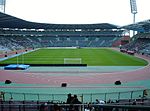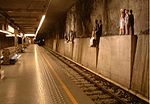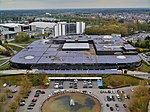Houba-Brugmann metro station
1985 establishments in BelgiumBelgian railway station stubsBrussels Metro stubsBrussels metro stationsCity of Brussels ... and 1 more
Railway stations opened in 1985

Houba-Brugmann is a Brussels metro station on line 6. It opened on 5 July 1985 and is located under Avenue Houba De Strooper/Houba De Strooperlaan, near Brugmann University Hospital, in Laeken, in the northwest of the City of Brussels (Belgium). It is jointly named after the city official Louis Houba and the 19th-century philanthropist Georges Brugmann.
Excerpt from the Wikipedia article Houba-Brugmann metro station (License: CC BY-SA 3.0, Authors, Images).Houba-Brugmann metro station
Avenue Houba-de Strooper - Houba-de Strooperlaan, City of Brussels
Geographical coordinates (GPS) Address Website Nearby Places Show on map
Geographical coordinates (GPS)
| Latitude | Longitude |
|---|---|
| N 50.890277777778 ° | E 4.3369444444444 ° |
Address
Houba Brugmann
Avenue Houba-de Strooper - Houba-de Strooperlaan
1020 City of Brussels
Belgium
Open on Google Maps









